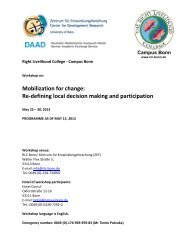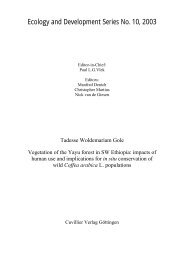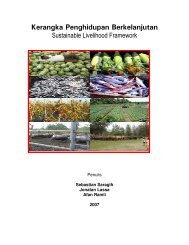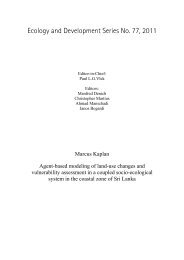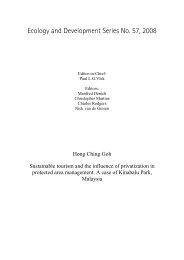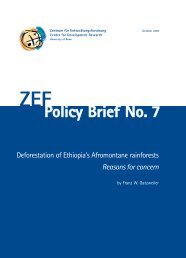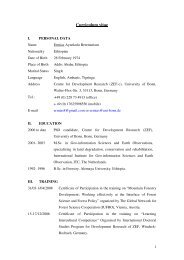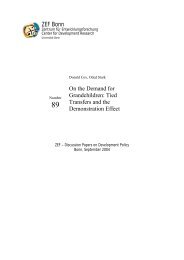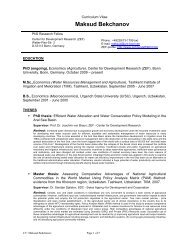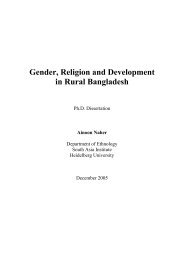ZEF Bonn
ZEF Bonn
ZEF Bonn
Create successful ePaper yourself
Turn your PDF publications into a flip-book with our unique Google optimized e-Paper software.
Somalia, Ethiopia and elsewhere, have triggered a flow of refugees to the West that<br />
has greatly enhanced the consciousness of living in a unified, interrelated global<br />
system. The refugees have contributed substantially to building up the political will<br />
for prevention, early action, intervention, and peace-making that complements the<br />
more instrumental power-balance arguments of traditional foreign policy. Seen from<br />
a global point of view, the many small-scale wars and confrontations spreading in<br />
the newly independent states or in democratising societies of established states have<br />
replaced the confrontation between East and West as the main lines of conflicts and<br />
as major global security risks-albeit on a reduced scale compared to the truly<br />
catastrophic dangers of a Cold War confrontation.<br />
During the 1990s, many governments adjusted their foreign and security policy to<br />
this complex constellation of multiple small-scale confrontations with no clear strategic<br />
implications for Western countries. More specifically, several policy approaches<br />
to prevent, mitigate, or peacefully settle conflicts have been formulated during the<br />
last decade, both by international organisations such as the UN, NATO, the Council<br />
of Europe, and the OSCE, and by national governments and various sectors of the<br />
NGO community. These include, first, a number of options for outside intervention<br />
to prevent escalation in the pre-conflict phase. Several approaches and concepts,<br />
including early-action, round-table diplomacy, permanent field missions, etc., have<br />
been developed, and institutions such as the OSCE, the Council of Europe, and<br />
various national governments have become active in this field.<br />
Second, new techniques for negotiating peace in protracted civil wars have appeared<br />
and have been combined or alternated with military interventions and peace-enforcing<br />
operations. They range from negotiations in sequestered places under heavy political<br />
and military pressure from the international community (such as the negotiations in<br />
Dayton, Rambouillet, or Stornton) to behind-the-scenes negotiations at the kitchen<br />
table organised by non-governmental organisations, such as the famous Oslo negotiations<br />
between the PLO and Israel, as well as various forms of combining official<br />
and unofficial diplomatic efforts to bring about peace, now generally labelled<br />
“multi-track" diplomacy.<br />
Third, a whole new branch of mostly NGO activities has developed around the idea of<br />
mediation and dialogue between communities in conflict, some involving mostly the<br />
leadership level, others targeting civil society organisations from the different groups<br />
or their grassroots. The aim is to overcome entrenched stereotypes and intolerance<br />
considered to be at the root of the conflicts. Techniques include interactive conflict<br />
resolution, conflict transformation, and finally psycho-political trauma cure.<br />
Fourth, a variety of unspecific preventive measures at the level of political institutions<br />
have also been fostered, among other reasons because they are thought to<br />
bring peace and stability to conflict-torn societies. This includes good governance,<br />
the rule of law, and most importantly, democratisation. Many policy-makers believe<br />
that this trio of institutional reforms will automatically lead to a “civilisation" of<br />
political behaviour and also to a de-escalation of ethnically-toned political tension.<br />
These new or rediscovered policy measures have been offered, tested, or implemented<br />
with varying degrees of success in a number of conflicts since 1989: in Ireland,<br />
Bosnia, Macedonia, Corsica, Sri Lanka, Indonesia, Bangladesh, The Philippines,<br />
Chechnya, Georgia, Turkey, Nagorni-Karabach, Sudan, Sierra Leone, Burundi, Rwanda,<br />
Nicaragua, Ecuador, Guatemala, and Colombia, to name just a few of the more<br />
Essay<br />
During the 1990s, many<br />
governments adjusted their<br />
foreign and security policy to<br />
addressing multiple small-scale<br />
confrontations. New techniques<br />
for negotiating peace in<br />
protracted civil wars have been<br />
combined with military interventions<br />
and peace-enforcing<br />
operations.<br />
17



